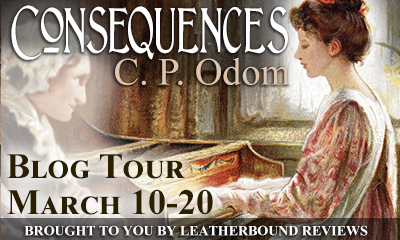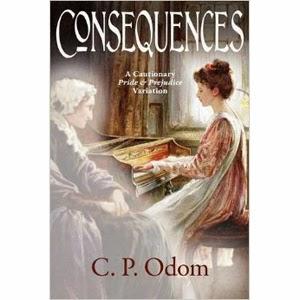 Hello, Janeite friends!
Hello, Janeite friends! I hope that you're fine and merry wherever you are and , especially, that you are ready to join today's guest at My Jane Austen Book Club, C.P. Odom. Let's discuss his new variation of Jane Austen's Pride and Prejudice, Consequences. Looking forward to reading your comments to the guest post and to the excerpt from Consequences!

C. P. Odom
My second novel, Consequences, was recently published by Meryton Press, and Maria Grazia has been gracious enough to invite me to talk about it. Both it and my first novel, A Most Civil Proposal, are variations on Jane Austen’s Pride and Prejudice. Essentially, they are “what if” stories, which look at how things might have turned out if some element of the story went in a different direction. A Most Civil Proposalpivoted around Darcy making a more civil proposal at Hunsford rather than the proud and arrogant proposal as in the book. Would that really lead the story in a different direction and, if so, how would events transpire? The critical point in Consequences is Elizabeth Bennet’s angry and vituperative rejection of Darcy’s proposal. The book has two parts resulting from differing consequences resulting from that critical decision.I’ve read most of Austen’s other novels, but Pride and Prejudice is the one that continues to call to me. Both my two novels came into the world as fan-fiction postings on the old Hyacinth Gardens website. I kind of stumbled into reading and then writing Jane Austen fan-fiction by accident, resulting from reading my first wife’s beloved Jane Austen’s books following her untimely passing almost twenty years ago. I’m continually surprised to find myself writing in this arena—after all, as a long-time left-brained engineer by training and a former Marine by inclination, one would think my writing efforts would be in something other than Jane Austen’s world. But life is always full of surprises, isn’t it?
That said, I thought it might be interesting to examine the background behind what I considered the critical turning point in consequences, which was Elizabeth’s rejection (with extreme prejudice, to use a term from various spy-thrillers I’ve read) of Darcy’s quite fumbling attempt at a proposal. Was that rejection justified? And if so, was the sheer fiery nature of her rejection a serious error?
I’ll start by saying that I believe most readers today find Elizabeth’s refusal of Darcy’s inept proposal to be laudatory and consistent with her character. They believe it would have been a compromise of her ideals and standards to have accepted such a man as Fitzwilliam Darcy, with his pride and arrogance and selfish disdain for others, as well as his separation of Jane and Bingley as well as his supposed malfeasances against Mr. Wickham. I believe admiration of Elizabeth’s character is one of the reasons for the enduring popularity of Pride and Prejudice, and I share it. However, at the same time, I think the reader ought to be aware that such an attitude reflects OUR twenty-first century worldview rather than the much different Regency England standards. Austen was certainly aware of what her society expected a gently born young lady to look for in a marriage: financial security for herself and her children. Her awareness of that fact is the basis for Elizabeth’s statement to Jane when she tells her of Darcy’s proposal. Elizabeth says, “You do not blame me for rejecting him?”
To our modern sensibilities, that statement is just accepted: “Of course, no one would blame you,” we tell ourselves, with our modern worldview, but in Regency England, most everyone would have the opposite point of view. Marriage was almost universally considered from the point of improving one’s fortune and/or position in society. A young lady who turned down such an offer of marriage from Darcy, an offer that would provide for her and her children’s future as well as rescue her family from the clutches of poverty, would be judged as a very foolish young lady indeed. And if her family did suffer impoverishment as a result of an opportunity lost, society would have little sympathy for her.
So these are the reasons (most of which are implicit in the realities of Regency times) for my contention that it was truly shocking for Elizabeth to reject what would be considered a brilliant match (for her, if not for Darcy) by the rest of her society. But Austen was writing a novel, not a history, and was thus able to craft a heroine with the strength to defy society’s rules and remain true to her own wishes and hopes. And remember, Elizabeth had previously rejected a different but similar form of security for her family in the person of the foolish (and odious) Mr. Collins!
We should also be aware that the idea of marrying for love was changing during Regency times and becoming more acceptable in the upper classes, which had previously married exclusively for fortune and social standing. In fact, love was considered a dangerous emotion in what was considered a critical social contract. The best most marriages could hope for was the milder emotion of “affection,” which was considered felicitous and entirely appropriate. Undoubtedly, the changing times were another reason for the popularity of Pride and Prejudice.
So this was my background for the critical decision point, and events are resolved in Pride and Prejudice when the lovers meet unexpectedly at Pemberley and renew their romance—though there are still numerous hurdles before a happy ending is reached. But what if that meeting at Pemberley had not taken place, for any of a multitude of reasons? Then Darcy and Elizabeth would go their separate directions, the Bennet family would be enmeshed in the disaster of Lydia’s supposed elopement, and Darcy would not be on hand to avoid the subsequent disasters. He would be left in ignorance of what happened to the Bennet family, and Elizabeth would be certain he would go to any lengths to avoid ever being in her presence. The seeds of much angst would be sewn. Thus goes Book 1, “The Road Not Taken,” while in Book 2, “The Sleeper Wakes,” Elizabeth wakes from a horrendous nightmare (which was everything that occurred in Book 1) at Hunsford prior to Darcy’s proposal, and the lingering effects of that mostly-unremembered-but-still-emotional event cause her to accept instead of reject that proposal. Since I’m not a melancholy type, trust me when I say this surprising (to present day readers, note!) doesn’t turn out to be nearly the horrible mistake that she thinks it will be.
Thanks to Maria Grazia for letting me talk about my book, and I hope I haven’t scared off any potential readers. Below is a short excerpt from Consequences for your perusal. Thanks for reading!
C. P. Odom
~~~~~~~~~~~~~~~**********~~~~~~~~~~~~~~~
 About the book - ConsequencesConsequences is a cautionary tale about the evils of hasty judgment, revisiting Jane Austen’s Pride and Prejudice and one of those pivotal moments when Elizabeth Bennet throws away Mr. Darcy’s offer of marriage so decisively. What transpires from that point is well known to Austen’s extensive readership, but what if even one element in the chain of events in her novel turns out differently? Does Austen’s happy ending eventually come to pass, or is the outcome more bleak?
About the book - ConsequencesConsequences is a cautionary tale about the evils of hasty judgment, revisiting Jane Austen’s Pride and Prejudice and one of those pivotal moments when Elizabeth Bennet throws away Mr. Darcy’s offer of marriage so decisively. What transpires from that point is well known to Austen’s extensive readership, but what if even one element in the chain of events in her novel turns out differently? Does Austen’s happy ending eventually come to pass, or is the outcome more bleak? And if, in order to secure financial security for her loved ones, Elizabeth does not reject Darcy, is she married to a proud, arrogant, disdainful man who, as she feared, forces her to deny her own relatives and thus condemns her to a lifetime of misery? Or does she find herself married to a man who cares enough for her to reject the opposition of his family and chance his very standing in society in order to marry a woman he loves beyond measure?
Consequences, written by the author of A Most Civil Proposal, explores two alternate realities—both tragedy and triumph.
Excerpt from Consequences—first part of Chap. 15:
Chapter 15
“Every great mistake has a halfway moment, a split second when it can be recalled and perhaps remedied.”
—Pearl S. Buck, American author
Thursday, April 9, 1812Elizabeth closed the door to her room firmly behind her, having to struggle to avoid slamming the door in the flame of her anger. As she threw her bonnet, shawl, and gloves on her bed, she looked out her window and saw Colonel Fitzwilliam passing through the gate, evidently on his way back to Rosings.“I understood that there were some very strong objections against the lady.”Those were the words Colonel Fitzwilliam used. Parts of his assertion were spoken in jest; he thought little of the import of it to his companion, who took his meaning in quite a different direction. To her, it appeared to be an accurate representation of Mr. Darcy, and her feelings were so greatly aroused that she did not trust herself to make an answer. It took all of her self-control to maintain a façade of amiability for the benefit of the good colonel, and she was forced to abruptly change the subject.Their remaining conversation was on indifferent matters until they reached the Parsonage. Colonel Fitzwilliam did not stay long after they arrived, and as soon as he departed, Elizabeth immediately fled upstairs to her room. She needed to be by herself with the door safely shut, so she could think on what she had heard without interruption.“I understood that there were some very strong objections against the lady.”There appeared to be no other possibility; Colonel Fitzwilliam had been talking of Jane and Mr. Bingley when he told his story, even if he had not a suspicion of it. Certainly, Mr. Darcy had immense sway over Mr. Bingley, and it was not to be supposed he could wield the same influence on any other person in the world.“And I suppose these strong objections were probably that she had one uncle who was a country attorney and another who was in trade in London,” she said aloud as she paced the floor angrily. “How could there be any objection to Jane herself? With her excellent understanding and disposition as well as the most cultured manners possible, who could object to her?”And here I thought Jane’s misery was mostly the product of Miss Bingley and her sister! Elizabeth thought angrily. I never doubted Mr. Darcy had some part in it, but I was obviously mistaken! That man’s vanity and arrogance was the major cause of all that Jane suffered and continues to suffer. He has ruined, perhaps forever, every hope of happiness for the most affectionate, most generous heart in the world!“I understood that there were some very strong objections against the lady.”And if there could be no objections against Jane, there could equally be no objections against my father, who has abilities that everyone, even Mr. Darcy, must recognize. And as for my mother, well…When she thought of her mother’s behavior at the Netherfield ball, which Mr. Darcy could not have failed to observe, though he gave no indication of it, even Elizabeth winced in embarrassment. However, as she continued to consider it, she soon managed to convince herself that even her mother’s silliness could not have played a material part in Mr. Darcy’s actions.It was his pride, that arrogant, overweening pride which inspired his actions, she thought. Not even my mother’s want of sense could have wounded his pride as much as my family’s want of connections. And, of course, he also must have wanted to retain Mr. Bingley for his sister!The agitation and tears brought on by her anger at Mr. Darcy were well in progress, with a headache already beginning, when a soft knock came at the door. Elizabeth knew it must be Charlotte, but she did not want to talk to anyone at the moment, so she said nothing.Charlotte, however, had observed her friend’s distress when she abruptly went upstairs to her room, and she deduced Colonel Fitzwilliam must have upset her. She was at first disposed to leave Elizabeth alone, but she decided this might be related to the subject they discussed early that morning. So, when there was no answer to her knock, she impulsively opened the door and went inside.As she closed the door behind her and saw Elizabeth’s pale face and tear-streaked cheeks, Charlotte knew she had been correct. Accordingly, after she sat down beside the bed and softly asked Elizabeth what was troubling her, it took only a few minutes of gentle questioning to elicit all the details of the conversation with Colonel Fitzwilliam. Then, while Elizabeth lay back on the bed, her face turned toward the wall, Charlotte considered what to do. She had tried reason and logic with, on balance, positive results, but she knew how clever her friend was. Her earlier victory, if it could be called a victory, was one of the few she ever managed in arguing with Eliza. Thus, she decided she would not repeat her tactic but would take a different approach…Elizabeth was convinced of what Charlotte was going to say, and she was already marshalling her arguments against it. She knew Charlotte would advise her to think of her family, of her sisters, of Jane. She would counsel caution, practicality, and reasonableness. But Elizabeth’s blood was up, and she was not going to be manoeuvred again into agreeing with Charlotte’s appeal to rationality. It was because she was so certain of what advice would be urged on her that she was not prepared for Charlotte’s actual response.“Elizabeth Bennet,” Charlotte snapped with cold and angry vehemence, “do not try to tell me this so-called revelation came as a surprise to you! You are simply trying to back out of the promise you made to me just this morning!”“What?” Elizabeth said in confusion, sitting up in shocked surprise. “I do not understand what you mean.”“Eliza, I always knew Mr. Darcy must be primarily responsible for separating Jane and Mr. Bingley. Since we both know how quick and insightful you are, I simply cannot believe you could have thought differently. The conversation you had today with the colonel cannot have come as a surprise to you.”“But…but…” stammered Elizabeth.“I cannot remember any time when we were in Hertfordshire that I observed Mr. Bingley being influenced by either of his sisters. For example, do you think either Miss Bingley or Mrs. Hurst wanted to come to the assembly that first night when we saw them?”“Well, no…” answered Elizabeth reluctantly.“Exactly. They both hated being there every second. That was obvious. Yet Mr. Bingley came and gave every evidence of enjoying himself. And do you think that Miss Bingley wanted to come to the gathering at my father’s house where you played the pianoforte for us?”“Well…”“Again, Mr. Bingley came despite his sisters being miserable. And lastly, do you not think that both of Mr. Bingley’s sisters must have strenuously opposed the ball Mr. Bingley hosted at Netherfield?”This time Elizabeth only shook her head, her mouth open at the relentlessness of her friend’s argument.“Precisely. So, if Mr. Bingley did not allow himself to be influenced by his sisters in any of these decisions, why would you think they influenced him to leave Netherfield and not return? No, that always had to have been Mr. Darcy. Only he could have had the influence to make Mr. Bingley listen to him since his friend obviously ignored the advice of his sisters on most occasions. So how can you suddenly be so very angry with Mr. Darcy when you must have been able to come to the same conclusions I did months ago?”Elizabeth was quite taken aback, for she truly never followed the path of logic in the way Charlotte now outlined. Finally, she was able to say, “It does seem so clear when you state it like that, Charlotte, but believe me, I really had not followed your reasoning at all. Jane was so blind, believing Miss Bingley was her friend and thus would not deceive her, so I was determined to argue otherwise and never thought of what you just related.”“But now you must believe my premise, Eliza. I am sure Miss Bingley and Mrs. Hurst never wanted Jane for a sister, but Mr. Bingley would not have been swayed by their arguments. He was too used to ignoring them. But Mr. Darcy surely never tried to convince Mr. Bingley about the assembly or the ball at Netherfield. He knew Mr. Bingley needed to build associations with the neighbourhood families. In addition,” Charlotte said, as a sudden thought struck her, “Mr. Darcy had another reason not to oppose his friend. I remember he sought a dance with you at my father’s gathering and then actually secured a dance at the Netherfield ball. I think that he must have been half in love with you even then!”“Oh, Charlotte,” Elizabeth laughed, “your logic was most convincing about Mr. Bingley, but now you are venturing into fancy!”“Did Mr. Darcy ever ask any other of the young ladies in the neighbourhood to dance? Did he ever spend time in conversation with any of them?”“Perhaps not, but our ‘conversations’ did not consist of pleasantries! They were mostly argumentative!”“Perhaps, but were you not using those quick wits to mock Mr. Darcy because of the dislike you had taken to him? Yet he kept coming back, as tongue-tied then as he has been at the Parsonage. And you just told me Colonel Fitzwilliam stated Mr. Darcy has already delayed their departure once! I begin to think even you must admit the evidence is mounting!”“Charlotte, Charlotte, I know you only want the best for me, but this is too much! No, I will keep my promise to you, which will be quite easy, for nothing will transpire. And Mr. Darcy and his cousin will be gone from Rosings on Saturday, so I may enjoy the last week of my visit without further distraction!”Charlotte did not try to argue this point, which was, in any case, a secondary item. She could not be certain whether there was a real attraction on Mr. Darcy’s part toward her friend, though she thought it increasingly likely. She only wanted to make sure Elizabeth did nothing impulsively if her suspicions were right, and Elizabeth just reaffirmed her promise. So she was well content.***
C.P. Odom’s blog: http://colinodom.merytonpress.com
Buy Links:
Amazon
B&N

